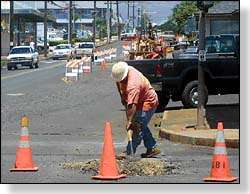Some like it hot, but they’re careful If construction workers Val Badua and Lester Contrades, building contractor Tony Melchor and landscapers Kaulana Kaneakua and Kane Pilkington know they will be working under a hot sun, they will bring their best
Some like it hot, but they’re careful
If construction workers Val Badua and Lester Contrades, building contractor Tony Melchor and landscapers Kaulana Kaneakua and Kane Pilkington know they will be working under a hot sun, they will bring their best friend to work: Water.
Water is their main defense against heat exhaustion and heatstroke, which can be fatal.
Their jobs leave the Kauaians constantly exposed to rain and sunshine, unlike many other Kauaians who work in air-conditioned offices. At times, they and other outdoor laborers work on days when the air is still and summer temperatures reach 90 degrees.
Yet, they said they would not switch to inside jobs, because they like working outdoors.
For Badua, Pilkington, Kaneakua, Melchor and Contrades, the risk of heat exhaustion took on deeper meaning with the heatstroke death of Minnesota Vikings football player Korey Stringer in July.
Heatstroke is the most severe form of heat illness. It can occur even among people who are not exercising, depending on the weather.
Whether exercise-related or not, though, a person with heat stroke usually has a very high temperature (106 degrees Fahrenheit or higher) and may be delirious, unconscious or having seizures.
Heat exhaustion also is a result of excessive heat and dehydration.
Contrades, a flagman for Goodfellow Brothers, which has a $7 million contract to reconstruct Rice Street in Lihu’e, said he is constantly aware of the danger of heat exhaustion and stays hydrated while on the job.
Because he drinks the equivalent of 12 to 18 glasses of water, Contrades said his energy and stamina remain high throughout the work day.
Contrades, a member of Local 368, the Hawai’i chapter of the Laborer’s Union of North America, said he has worked outdoors since 1992 and likes it that way.
“One of the benefits of this job is that it goes by so fast,” said Contrades as he prepared to direct heavy traffic through the Rice Street construction area in front of Kalapaki Villas condominium. “As far as the heat goes, you get used to it.”
Contrades’ foreman, Badua, encourages his 10-member crew to take as many water breaks as needed.
“Time is money, but it could cost us more money if somebody gets dehydrated and collapses on the job,” Badua said, adding he makes sure that five-gallon water jugs are filled with water and energy drinks for the workers.
Badua, 50, said he learned the value of hydration during combat duty in the Vietnam War.
Last week on Kaua’i, with an excavator, Badua’s crew dug dirt out from around protected water, electric and sewer lines on Rice to install new drain pipes. Some men worked in cavernous spaces nearly 20 feet beneath the street, where the air is thick with dust and the space is dark.
Melchor, a building contractor who was inspecting a home at the exclusive Puako subdivision near Kukui Grove Shopping Center when he was asked about how he handles the heat when working outdoors, advised “getting rest if too hot, drinking water and wearing sunglasses and a hat.”
On Ahukini Road to Lihu’e Airport, Kaneakua and Pilkington, who work 10 to 12 hours a day as laborers for Kaua’i Nursery & Landscaping, said they avoid dehydration by pacing themselves, taking breaks and drinking water.
“I take a 15-minute break when necessary,” Pilkington said.
Pilkington, 23, and Kaneakua, 26, were replacing plants and shrubs along Ahukini as part of the Gateway Project, a multi-million-dollar landscaping project that involved work on Kapule Highway, as well.
Pilkington winced when he talked bout planting “50 trees a day” during the project.
Their type of work has put them on the edge of exhaustion at times, but Pilkington and Kaneakua said the heat isn’t going to drive them to office jobs.
“We get job flexibility,” Kaneakua said. “One day you are in one part of the island, and the next day you are somewhere else. I like it.”
Staff writer Lester Chang can be reached at 245-3681 (ext. 225) and mailto:lchang@pulitzer.net


